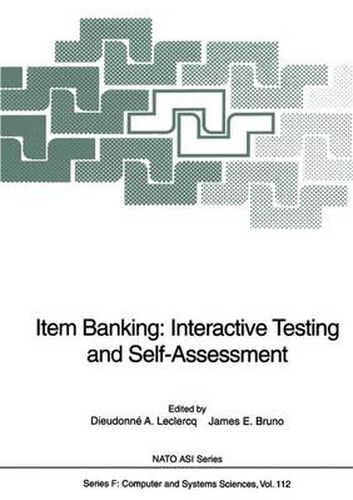Readings Newsletter
Become a Readings Member to make your shopping experience even easier.
Sign in or sign up for free!
You’re not far away from qualifying for FREE standard shipping within Australia
You’ve qualified for FREE standard shipping within Australia
The cart is loading…






Assessment has long been recognized as a key feature inlearning efficacy, especially through formative evaluation. Item banking, the storage and classification of test items,is an essential part of systematic assessment. This volume is based on a NATO Advanced Research Workshopheld as part of the Special Programme on AdvancedEducational Technology. The workshop brought togetherscholars from around the world to discuss and criticallyanalyze the issues and problems associated with SubjectiveProbability Measurement (SPM) or the more generic researcharea called self-assessment. Recent advances in computertechnology (expert systems, interactive video disks, andhypermedia) along with the developing sophistication ofself-assessment scoring systems based on SPM made thisconference particularly important and timely. The book is divided into three main parts:- The input: item banking and hypermedia- The process: subjective probabilities- The output: teaching and learning feedbacks. In summary, although SPM is a difficult theoretical conceptfor most educators to comprehend, the sophisticated natureof modern computer systems coupled with comprehensiveformative and summative evaluation and self-assessmentsystems make SPM transparent to the user.
$9.00 standard shipping within Australia
FREE standard shipping within Australia for orders over $100.00
Express & International shipping calculated at checkout
Assessment has long been recognized as a key feature inlearning efficacy, especially through formative evaluation. Item banking, the storage and classification of test items,is an essential part of systematic assessment. This volume is based on a NATO Advanced Research Workshopheld as part of the Special Programme on AdvancedEducational Technology. The workshop brought togetherscholars from around the world to discuss and criticallyanalyze the issues and problems associated with SubjectiveProbability Measurement (SPM) or the more generic researcharea called self-assessment. Recent advances in computertechnology (expert systems, interactive video disks, andhypermedia) along with the developing sophistication ofself-assessment scoring systems based on SPM made thisconference particularly important and timely. The book is divided into three main parts:- The input: item banking and hypermedia- The process: subjective probabilities- The output: teaching and learning feedbacks. In summary, although SPM is a difficult theoretical conceptfor most educators to comprehend, the sophisticated natureof modern computer systems coupled with comprehensiveformative and summative evaluation and self-assessmentsystems make SPM transparent to the user.